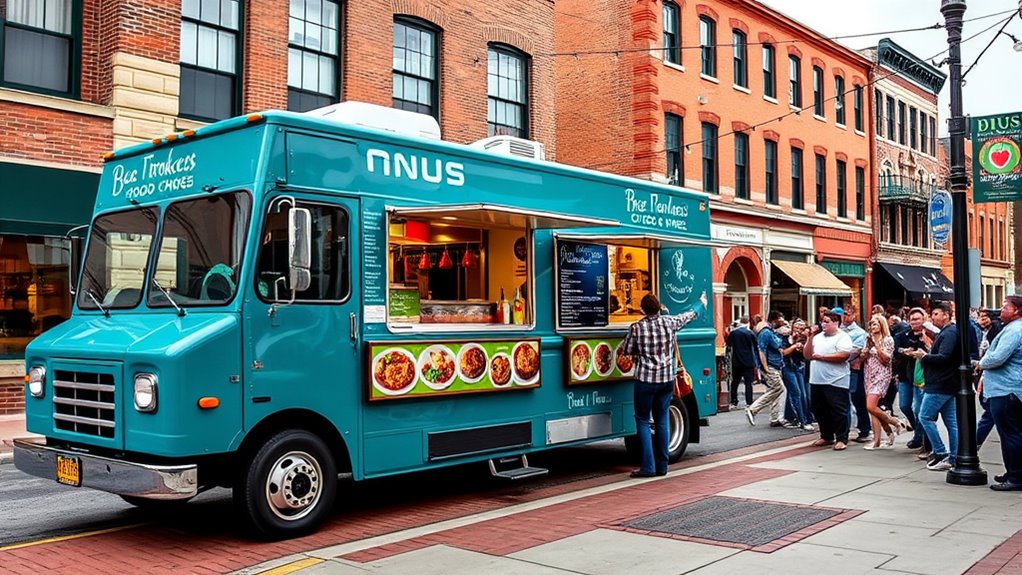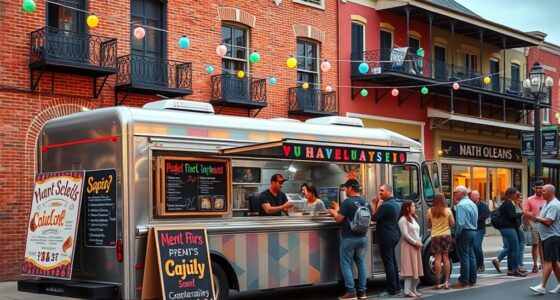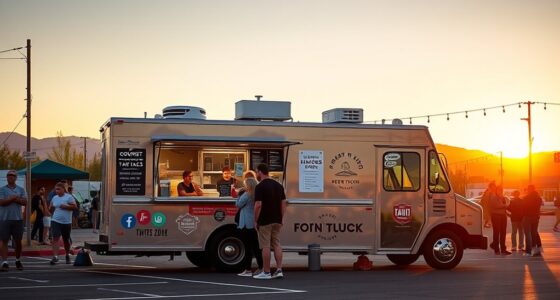To open a food truck in Dover, Delaware, you’ll need permits like a state Food Establishment Permit (~$100/year), city business licenses, and event-specific licenses. Costs include truck purchases ($40,000-$150,000), equipment, and ongoing expenses such as fuel, supplies, and insurance. You’ll want to operate in approved zones and participate in local events like Dover Days or festivals for visibility. Proper menu planning, safety compliance, and marketing on social media boost your success—more details on these key steps are ahead.
Key Takeaways
- Obtain essential permits including a Delaware Food Establishment Permit (~$100/year), city business license, and event-specific licenses.
- Budget for truck purchase ($40,000–$150,000), equipment, setup, and ongoing expenses like fuel, supplies, and insurance.
- Operate within designated zones and approved events such as Dover Days or street festivals, with proper zoning and fire safety compliance.
- Develop a menu focused on safe, compliant foods suited for truck capacity, emphasizing responsible sourcing and allergen labeling.
- Utilize social media, participate in local festivals, and leverage GPS apps to boost visibility and attract customers.
Essential Permits and Licensing Requirements
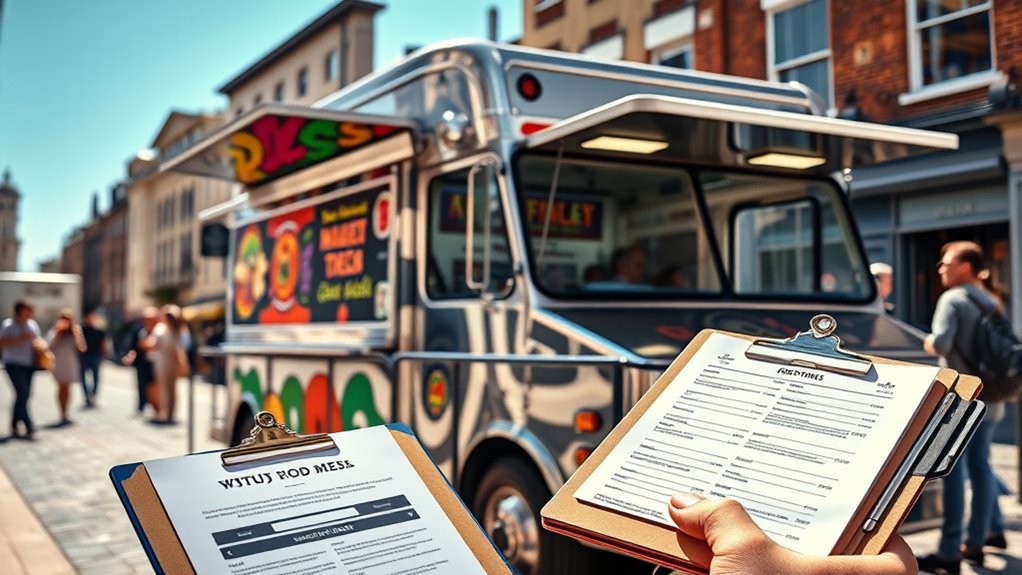
To operate a food truck in Dover, you need to secure several essential permits and licenses. First, obtain a Food Establishment Permit from the Delaware Office of Food Protection, which covers food storage, preparation, and vending. The annual fee is about $100, plus a plan review fee of $50–$100 depending on your truck’s size. You’ll also need a Servicing Area Agreement permit to define your cleaning and waste-discharge site. Additionally, you must get an Eating Establishment Business License and a Sales Representative Business License from Dover’s Planning and Inspections department, after receiving approval from the state health department. Fire safety inspections and compliance with NFPA standards are mandatory before operation. Finally, for special events, a Temporary Food Establishment License is required, with applications due at least 14 days in advance. Ensuring adherence to local health regulations is crucial for smooth operation.
Estimating Costs for Your Food Truck Business
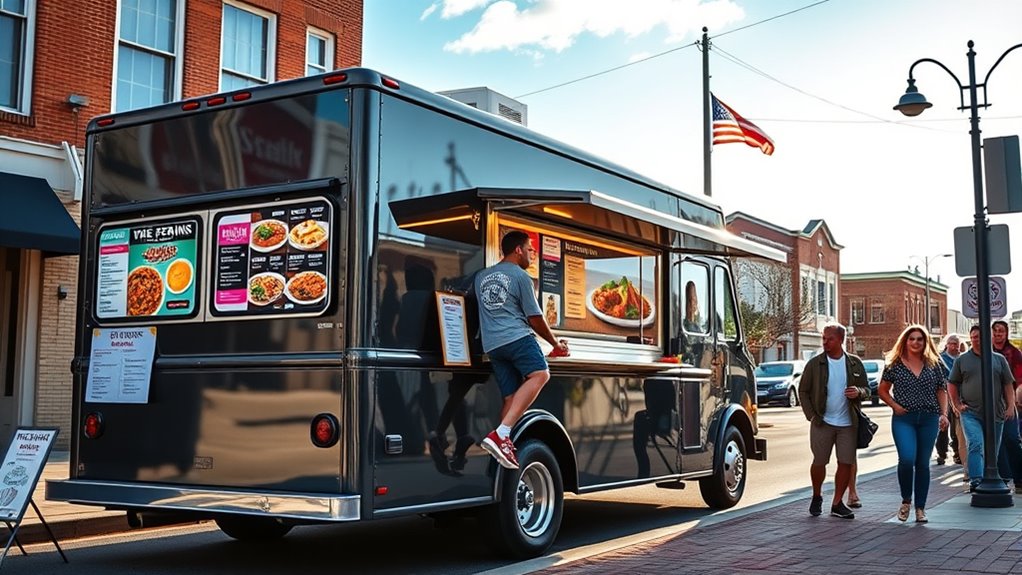
To plan your food truck business in Dover, you’ll need to estimate costs for permits, equipment, and ongoing expenses. These costs can vary widely based on your truck choice, setup, and local regulations. Understanding these key areas helps make sure you stay within budget and set realistic financial goals. Accurately estimating startup costs is essential for creating a sustainable business plan and securing any necessary financing. Additionally, having a clear understanding of ethical hacking can help protect your business digital assets from cyber threats.
Permit and Licensing Fees
Establishing a food truck in Dover involves several permit and licensing fees that you need to budget for upfront. The state mandates a Food Establishment Permit, costing about $100 annually, with a $50 or $100 plan review fee depending on your unit size. You’ll need a city Eating Establishment Business License after state approval, plus a Sales Representative license for mobile operation. Temporary event permits, valid for up to 14 days, typically cost between $50 and $150. Fees vary by permit type and scope. Here’s a quick overview:
| Permit Type | Cost | Requirements |
|---|---|---|
| State Food Establishment Permit | ~$100 annually | Application, menu, plans, review fee |
| City Business License | Varies | State approval, local registration |
| Temporary Event Permit | $50–$150 | Event forms, submission 10 days prior |
Equipment and Setup Costs
Purchasing and customizing a food truck is a significant part of startup costs, often making up 40-60% of your total investment. Expect to spend between $40,000 and $150,000 on a used or new truck, with custom builds adding another $15,000 to $50,000. You’ll need essential equipment like grills, fryers, and refrigerators, costing $15,000 to $50,000. Additionally, consider these setup costs:
- Ventilation, electrical, and plumbing modifications
- Utility connections for water, power, and waste disposal
- Branding decals or truck wraps
- Backup generators or power sources
- Initial inventory of utensils and supplies
Proper permits and safety inspections are essential to ensure your truck complies with local health and safety regulations, which can help avoid costly fines or shutdowns. These investments guarantee your truck meets safety standards and operates efficiently, which is crucial for compliance and establishing your reputation in the community, setting a solid foundation for your food truck business.
Operating and Maintenance Expenses
Running a food truck requires careful budgeting for ongoing expenses, which can substantially impact your profitability. Fuel and propane costs typically range from $500 to $2,000 monthly, depending on usage. Food and supplies expenses vary widely, often between $2,000 and $10,000, influenced by your menu size and sales volume. Labor costs usually make up 25-30% of revenue, translating to $2,000 to $12,000 per month. Maintenance expenses for vehicle and equipment average $300 to $1,500 monthly, higher for older trucks. Commissary kitchen rentals generally cost between $500 and $2,500. Don’t forget insurance premiums, usually $200 to $600 monthly, and licensing fees, which can be around $1,864 annually. Budgeting for unexpected repairs and marketing costs is also essential to keep your business running smoothly. According to industry data, most food truck owners allocate a portion of their budget specifically for unforeseen expenses to prevent cash flow issues.
Approved Locations and Event Opportunities in Dover
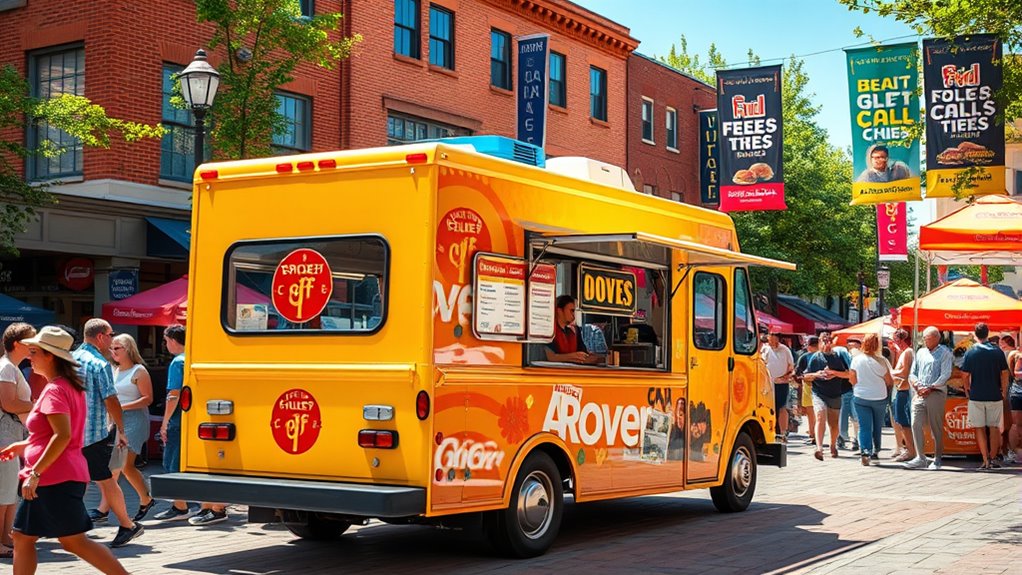
You need to operate within designated mobile zones and approved event sites in Dover to stay compliant. The city offers a list of sanctioned locations and special event venues where food trucks can set up without extra permits. These spots provide great opportunities to reach customers and grow your business while following local regulations. Furthermore, only food trucks with a current license and annual fire safety inspection can set up at these approved locations. Proper planning and understanding of regulatory compliance are essential to avoid penalties and ensure successful operation.
Designated Mobile Zones
In Dover, mobile food units must operate from permitted locations that meet strict zoning and health requirements. These designated zones ensure conformity with city ordinances and health standards. Approved areas typically include commercial and mixed-use districts, avoiding residential zones. You’ll need a valid Food Establishment permit and agreements with servicing facilities for waste disposal, cleaning, and restocking. Dover’s zoning laws are designed to protect residential neighborhoods from disruptive commercial activity. Key points include: – Operating from zones with proper permits linked to servicing sites – Ensuring servicing areas are equipped for waste, water, and supplies – Staying within commercial or mixed-use districts – Complying with zoning laws that restrict residential zones – Regularly returning to approved servicing locations for maintenance – Maintaining compliance with health and safety standards to ensure public safety and prevent violations. These zones help keep your mobile food business compliant and safe for the public.
City-Sanctioned Events
City-sanctioned events in Dover offer prime opportunities for food trucks to showcase their offerings and attract new customers. Major festivals like Dover Con 2025, held at 35 Loockerman Plaza, feature dozens of vendors, including food trucks, providing high visibility. Dover Days and seasonal festivals, such as the St. Patrick’s Day Festival, also welcome mobile food vendors at approved locations. Events at Dover Motor Speedway, like Gift of Lights, offer additional vendor space, especially during winter. Downtown Dover streets are often closed for street festivals, creating ideal spots for food trucks. Permitting is required from the city, with vendor spots allocated in advance. Participating in these events boosts your brand exposure and helps connect with diverse audiences, making them essential for growth. Event details must be confirmed with city officials to ensure compliance.
Menu Planning and Food Service Regulations
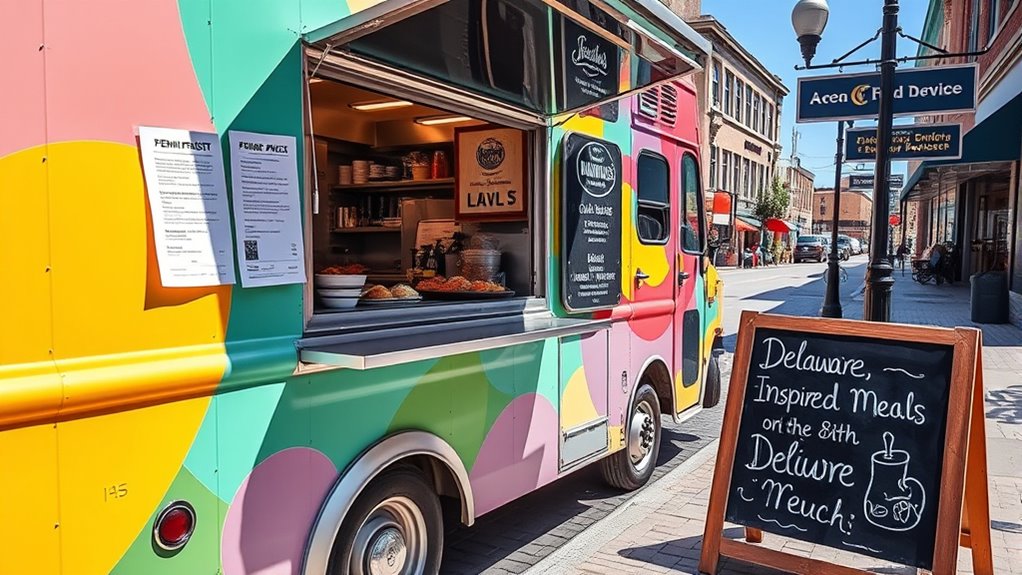
How can food truck operators guarantee their menu planning aligns with Dover’s food service regulations? Start by focusing on foods that reduce cross-contamination risks, meet Delaware’s temperature control rules, and fit your truck’s prep capacity. You’ll need to source ingredients responsibly, follow allergen labeling laws, and ensure safe storage. Remember, cooking methods are limited by safety codes, especially for grease-laden vapors, which require NFPA-compliant hoods and suppression systems. Consider these key points:
- Limit high-risk items or prepare them off-site at licensed facilities
- Design your menu around your truck’s size and permitted cooking techniques
- Use ingredients that are available locally and seasonally
- Avoid complex prep that exceeds your equipment’s capacity
- Ensure all ingredients and preparation methods stay compliant with health regulations
- Regularly review updates to food service regulations to stay current with any changes
- Incorporate safety standards to prevent accidents and ensure compliance, especially regarding ventilation and fire suppression systems.
Sticking to these guidelines keeps you safe and compliant while delighting customers.
Effective Marketing Strategies for Food Trucks
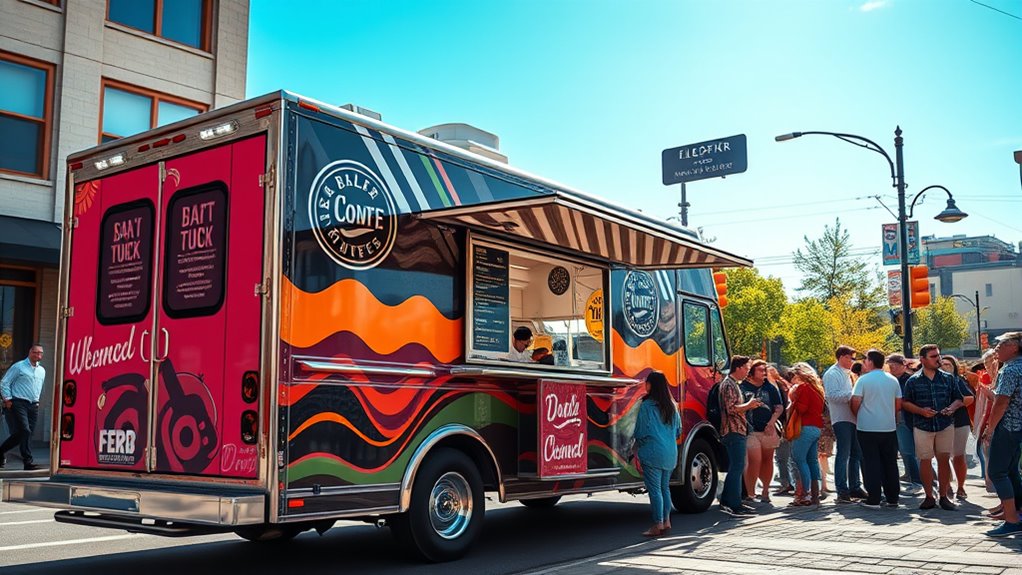
Effective marketing is essential for food trucks to stand out in Dover’s competitive scene. Social media is a powerful tool; 68% of truck owners use it regularly, with 75% favoring Facebook. These campaigns can increase sales by around 20% and drive customers to spend about 15% more. Additionally, 40% of customers find their favorite trucks through social media ads. Participating in local festivals and events is equally crucial, with 80% of trucks attending at least three annually to boost visibility and foot traffic. Using mobile apps and GPS tracking simplifies customer discovery and expands your reach. Incorporating data analytics and loyalty programs helps tailor marketing efforts, leading to higher ROI and repeat business. Digital tools like review platforms enable better feedback management, targeting Millennials and Gen Z with engaging content and local, sustainable options enhances your market presence. Leveraging Glycolic acid benefits in skincare marketing can also appeal to health-conscious consumers seeking natural, effective products.
Ensuring Health and Safety Compliance
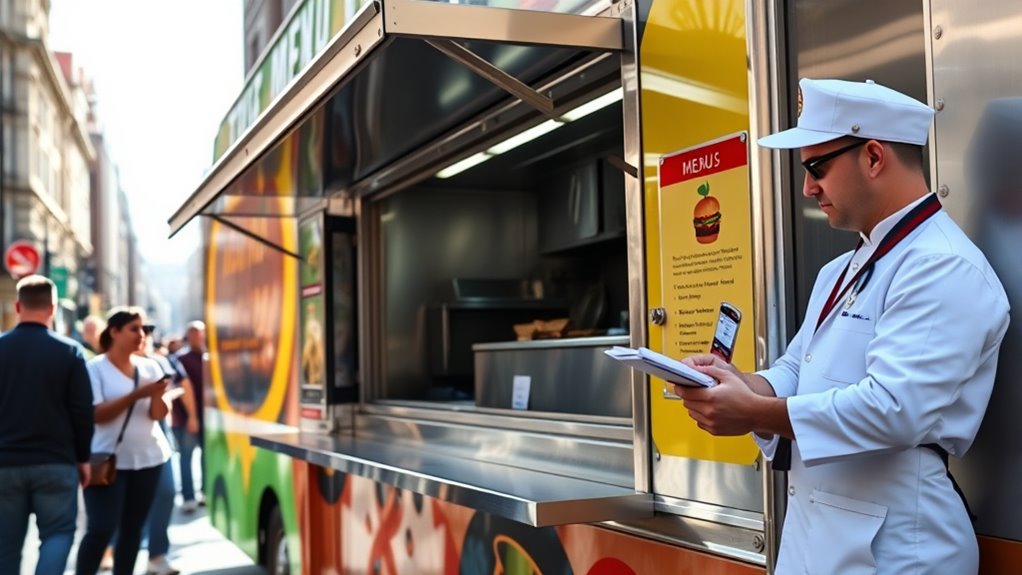
Ensuring health and safety compliance is vital for your food truck to operate legally and maintain customer trust in Dover. You need to obtain a valid Delaware Public Health license, pass fire and safety inspections, and secure permits for temporary events. Make certain your servicing area is properly established with the right permits for cleaning and waste disposal. Using professional voice actors in your promotional materials can help communicate your safety standards effectively to customers. To stay compliant, you’ll also need:
Maintaining health and safety compliance ensures your food truck operates legally and gains customer trust in Dover.
- Hand washing stations or approved hand sanitizer setups
- Proper waste management with trash receptacles
- Smooth, easily cleanable surfaces inside your truck
- Certified food safety training for all employees
- Adequate equipment, ventilation, and pest control measures
Regular inspections and documentation are essential to avoid violations and ensure your operation runs smoothly.
Frequently Asked Questions
How Long Does the Permit Approval Process Typically Take in Dover?
You’re wondering how long it takes to get your permit approved in Dover. Typically, the process ranges from 2 to 6 weeks, depending on how complete and accurate your submission is, plus scheduling inspections. If you submit detailed plans early and stay in touch with the Office of Food Protection, you can help speed things up. Be prepared for possible delays if additional inspections or corrections are needed.
Are There Any Restrictions on Operating Hours for Food Trucks in Dover?
You might think operating hours are flexible, but Dover actually has clear restrictions. You can’t start before 6 a.m., and most food trucks must wrap up by 10 p.m., depending on local noise and zoning laws. Special events may allow longer hours with permits. Staying compliant is essential; violating these rules can lead to fines or license revocation. Always check with city authorities to guarantee you’re operating within the permitted hours.
Can I Operate My Food Truck at Private Events Without City Permits?
You can operate your food truck at private events without city permits if you meet certain conditions. Usually, private property and small events don’t require city permits, but you still need permission from the property owner and compliance with health and safety regulations. Confirm you have the necessary health permits, follow sanitation rules, and coordinate with event organizers. Always verify specific requirements with local authorities to avoid issues.
What Are the Penalties for Non-Compliance With Health and Safety Regulations?
You risk hefty fines and even business closure if you don’t follow health and safety rules. If you violate sanitation, storage, or hygiene standards, Dover officials can issue citations, impose fines from $50 to over $500, and require immediate corrective actions. Repeated violations within a year lead to escalating penalties, license suspension, or revocation. Ignoring health inspections or refusing to produce permits can result in temporary closures or legal penalties.
Are There Specific Insurance Requirements for Food Truck Operators in Dover?
Think of your food truck as a ship sailing Dover’s busy waters—you need the right insurance to keep it afloat. Delaware requires commercial auto insurance with minimum liability limits, plus general liability and equipment coverage. If you serve alcohol, higher limits and endorsements are necessary. Protect your business from storms like accidents or theft by obtaining tailored policies. Regular reviews and proper documentation help you navigate regulations smoothly and avoid costly penalties.
Conclusion
Starting your food truck in Dover is like planting a seed—nurture it with permits, costs, and passion. As you navigate approved locations and craft your menu, remember each step is a drop of water helping your dream grow. With marketing and safety in place, your truck becomes a beacon of flavor in the community, symbolizing your journey from idea to vibrant reality. Embrace the process, and watch your culinary garden flourish.
